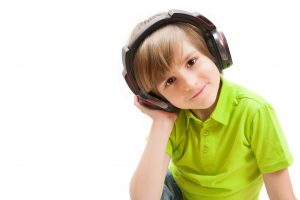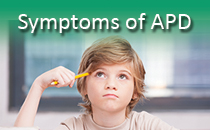
Individuals with autism spectrum disorder often have great difficulty with spoken language comprehension. This may be due to the higher-order global deficit of autism causing their difficulties, but these individuals often have specific auditory dysfunction. A diagnosis of Auditory Processing Disorder is not always appropriate, but these individuals do exhibit deficits in auditory processing and can benefit from APD intervention. Auditory Processing Center specializes in functional APD assessment for individuals on the autism spectrum to determine the type of auditory processing problems the child is experiencing and help identify effective therapies.
Individuals with autism spectrum disorder often have trouble understanding speech, especially in degraded acoustic environments; show noise intolerance /sound sensitivity; have temporal processing problems (difficulty with rhythm, pitch, and timing cues which can make it hard to recognize tone of voice and inflection cues that affect the meaning of what is said); and have deficits on dichotic speech tasks (when the ears are competing against each other) because their ears do not work well as a team. Due to differences in the corpus callosum, the body of neural fibers connecting the right and left hemispheres, these individuals often have inefficient processing between the two hemispheres of the brain. Many studies have shown this population benefits from dichotic listening therapy and inter-hemispheric transfer exercises, sound therapy to ease anxiety and reduce sensitivity to noise, as well as deficit-specific intervention to address weaknesses in other auditory processing skills.
Because of their primary diagnosis of autism spectrum disorder, these patients often aren’t referred to specialists for auditory processing evaluations, auditory training, or remediation programs. However, this is a disservice for this population because individuals with autism spectrum disorder can benefit from therapy to strengthen auditory processing skills.
Research has also shown that the improved clarity from remote microphone listening devices such as a Roger Focus system can be very beneficial for individuals with an autism spectrum disorder. Roger Focus remote microphone systems send the teacher’s voice directly to discreet earpieces worn by the child. This helps the listener hear each speech sound distinctly and reduces distracting background noise. It also has a therapeutic effect of improving the accuracy of neural responses for each speech sound, which facilitates learning to read and spell. In addition, studies show Roger Focus improves on-task behavior, tolerance of noise, aids social interaction, and improves educational outcomes.
For more information on the treatment of auditory processing deficits in children with autism spectrum disorder contact Auditory Processing Center.
Resources
Roger Focus Remote Microphone Systems for Individuals with Autism Spectrum Disorder




